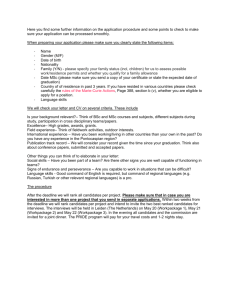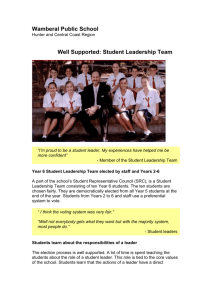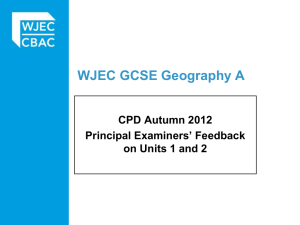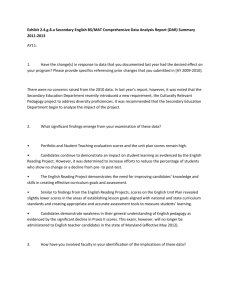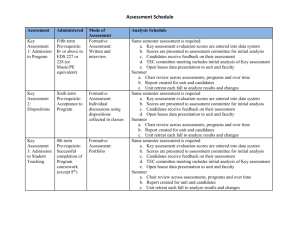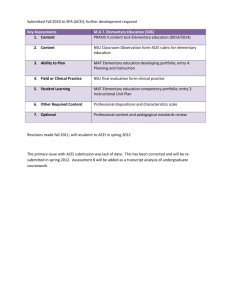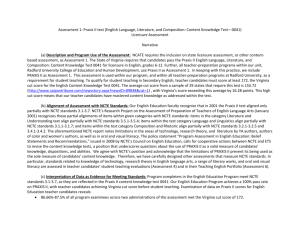Meeting Minutes - Department of Information Technology
advertisement
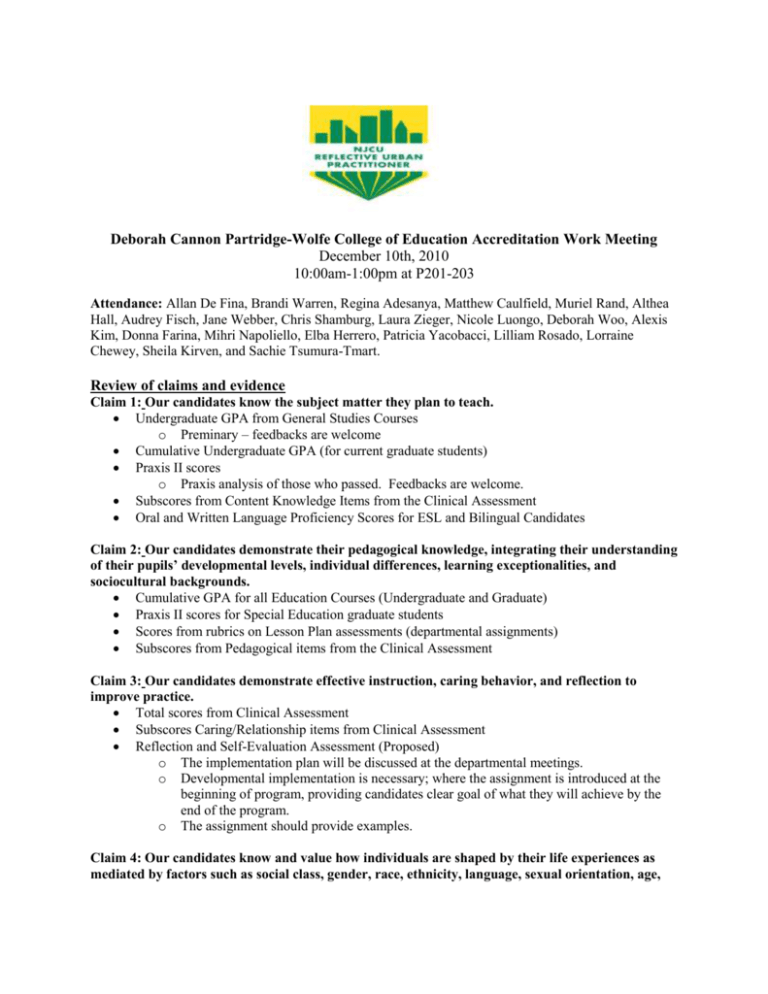
Deborah Cannon Partridge-Wolfe College of Education Accreditation Work Meeting December 10th, 2010 10:00am-1:00pm at P201-203 Attendance: Allan De Fina, Brandi Warren, Regina Adesanya, Matthew Caulfield, Muriel Rand, Althea Hall, Audrey Fisch, Jane Webber, Chris Shamburg, Laura Zieger, Nicole Luongo, Deborah Woo, Alexis Kim, Donna Farina, Mihri Napoliello, Elba Herrero, Patricia Yacobacci, Lilliam Rosado, Lorraine Chewey, Sheila Kirven, and Sachie Tsumura-Tmart. Review of claims and evidence Claim 1: Our candidates know the subject matter they plan to teach. Undergraduate GPA from General Studies Courses o Preminary – feedbacks are welcome Cumulative Undergraduate GPA (for current graduate students) Praxis II scores o Praxis analysis of those who passed. Feedbacks are welcome. Subscores from Content Knowledge Items from the Clinical Assessment Oral and Written Language Proficiency Scores for ESL and Bilingual Candidates Claim 2: Our candidates demonstrate their pedagogical knowledge, integrating their understanding of their pupils’ developmental levels, individual differences, learning exceptionalities, and sociocultural backgrounds. Cumulative GPA for all Education Courses (Undergraduate and Graduate) Praxis II scores for Special Education graduate students Scores from rubrics on Lesson Plan assessments (departmental assignments) Subscores from Pedagogical items from the Clinical Assessment Claim 3: Our candidates demonstrate effective instruction, caring behavior, and reflection to improve practice. Total scores from Clinical Assessment Subscores Caring/Relationship items from Clinical Assessment Reflection and Self-Evaluation Assessment (Proposed) o The implementation plan will be discussed at the departmental meetings. o Developmental implementation is necessary; where the assignment is introduced at the beginning of program, providing candidates clear goal of what they will achieve by the end of the program. o The assignment should provide examples. Claim 4: Our candidates know and value how individuals are shaped by their life experiences as mediated by factors such as social class, gender, race, ethnicity, language, sexual orientation, age, and social needs. Our candidates know, value, and engage in culturally responsive teaching to promote social justice, particularly in our urban areas. Cross-Cutting Themes: Multicultural Perspectives (Will be assessed with Claim 4) Learning to Learn (Will be assessed with Claim 3) Technology Overview of Technology Cross-Cutting Theme The followings were shared. ISTE (2008). National Educational Technology Standards for Teachers. Retrieved December 9, 2010 from http://www.iste.org.standards.nets-for-teachers/nets-for-teachers2008.aspx Jenkins, H. (2007). Expert from Confronting the Challenges of Participatory Culture: media Education for the 21st Century Retrieved December 7, 2010 from http://digitallearning.macfound.org/atf/cf/%7B7E45C7E0-A3E0-4B89-AC9CE807E1B0AE4E%7D/JENKINS_WHITE_PAPER.PDF (pp. 1-11) CAST. (2009). Excerpt from Universal Design for Learning Guidelines. Retrieved December 1, 2010 from http:///www.udlcenter.org/sites/udlcenter.org/files/UDL%20Guidelines_version1.doc (pp. 2-10) Bers, M. (2008). Constructionism as Developmentally Appropriate Practice. In M. Bers Blocks, To Robots: Learning with Technology in the early Childhood Classroom. New York: Teacher’s College Press. (pp.13-29). Presentation Workshops Everyday Media Makers in Education by Chris Shamburgurg This will be a hands-on session on easy-to-use media making tools for audio, video, and images. We will go over ideas, projects, and educational frameworks for the use of student- and teacher-created media in schools. Tutorials for faculty and students will be available as well as a supplemental information on the use of these tools in different COE departments. - http://web.njcu.edu/faculty/cshamburg/Content/teac_resources.asp Gaming Across the Curriculum: How to engage and Instruct in the 21st Century by Laura Zieger Game-Based Learning offers fun, interactive, digital simulations of physical phenomena to support teaching and learning. In this seminar, we will identify an array of free computer games that are playable through Web browsers. We will discuss games as pedagogical instruments and as a social and cultural phenomenon. Finally, participants will reflect on ways in which students can integrate game-based learning into the curriculum. A database collection of K-12 lesson plans integrating gaming will be provided. Explored games: - http://www.funbrain.com/brain/ReadingBrain/ReadingBrain.html - http://www.wordle.net - http://www.superteachertools.com - http://www.superteachertools.com/jeopardy/usergames/Dec201049/game1291933357.php Using a SMART Board in a K-12 Classroom by Nicole Luongo Participants will learn the basics of using an interactive SMART Board in a classroom setting. They will explore and examine various online SMART Board resources. Also, they will be provided with example lesson plans as well as strategies to use when teaching pre-service teachers how to integrate this tool into the current curriculum. - http://prezi.com/zyzppmdsbb0u/using-a-smart-board-in-a-k-12-classroom/ Department Group Work Each department discussed expectations for their candidates and evidence to use to demonstrate the technology cross-cutting theme. Topics covered: What are the technology outcomes you’d expect for your candidates? Where in your program do candidates learn these competencies? How are you (will you be) measuring these competencies?




